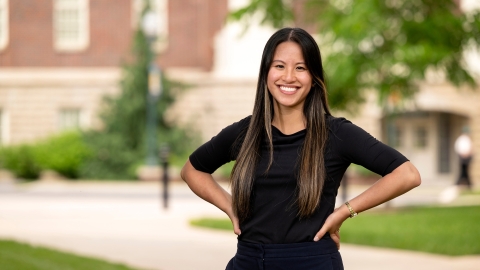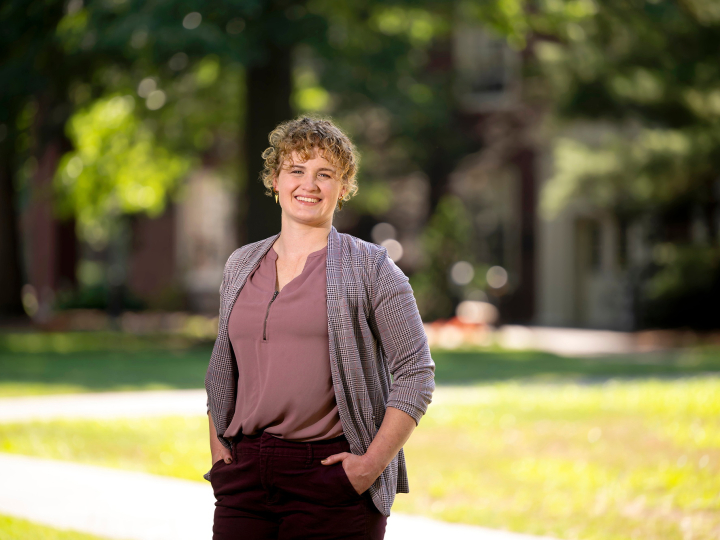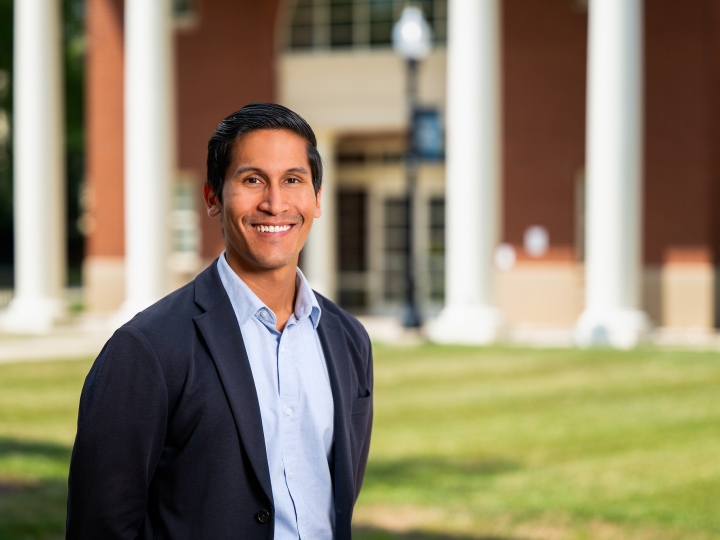
Olivia Boerman, Biomedical Engineering
July 22, 2025
Professor Olivia Boerman, biomedical engineering, is researching the therapeutic potential of ultrasound. Photo by Emily Paine, Marketing & Communications
"I'm really passionate about developing medical technologies that can serve underserved populations and under-resourced areas."
For most, adolescence is a time of great uncertainty, a period in which we struggle to balance the everyday anxieties of homework and school with the existential concerns of who we are and, perhaps just as important, who we're going to be. However, for Professor Olivia Boerman, biomedical engineering, it was in her teen years that she encountered a clarity of purpose and desire so rare among those who have yet to even obtain their driver's licenses.
"I started doing research in a lab at the Fox Chase Cancer Center in Philadelphia the summer after my freshman year of high school," says Boerman, who participated in the organization's Student Scientist program. "It felt a bit surreal to walk into this building every day with people whose day jobs were to cure cancer. I remember that summer thinking, 'This is definitely what I want to do. I want to keep exploring the front edge of science. I'm going to have a lab one day.' "
Throughout high school, Boerman worked in a lab and split her interests equally between biology and robotics. When it came time to start college, "biomedical engineering seemed like a really good marriage of the two." Choosing a college major can be a difficult decision, but as a member of Drexel University's Super Nova program, Boerman committed simultaneously to completing her bachelor's and doctoral degrees on a single, accelerated track.
When she arrived at Drexel, she immediately found a lab that studied the effect of shear stress on cells, which honed her interest in the relationship between mechanical stimuli and biological processes. As part of an extended, five-year bachelor's program, she had a lot of opportunities to explore different avenues of research, an experience which gave credence to that time-tested adage: understanding what you don't want is just as essential to understanding what you do want.
"I did a lot of really cool research in an industrial setting for big pharma, but I realized it wasn't for me," she says. "The freedom that academia offered to ask my own questions was really something that motivated me."
By the time she entered her doctoral program, she understood with even greater precision what inspired her. It wasn't just research. She wanted to do more than understand the complex and fundamental processes of the human body.
"I wanted to apply that understanding to some therapeutic that could have a direct impact on patients," says Boerman, who devoted her doctoral program to studying therapeutic ultrasound. When she graduated, she accepted a teaching position in Bucknell's College of Engineering, where she actualized the promise made by her teenage self years before: She got her own lab.
In 2024, Boerman received a two-year NSF Engineering Research Initiation Grant in the amount of $199,940 from the National Science Foundation Directorate for Engineering. This grant supports her investigative research into the therapeutic applications of ultrasound.
"The big question mark is, how does ultrasound advance healing? Does ultrasound stimulate blood vessel growth?" says Boerman. "The second aim of this grant will be to conduct robust bioinformatic analysis on the entire transcriptome — all 26,000 genes — to figure out the ways that cells are being impacted."
For Boerman, her decision to come to Bucknell didn't just hinge upon the University's creative possibilities for research. The College of Engineering also presented her with the chance to mentor a new generation of engineers.
"Because my journey really started in high school, I have a passion for extending this kind of research and to making it accessible to students," says Boerman, who advised eight students during her first summer as a Bucknell faculty member. "I come from an underprivileged background as a woman of color. I'm a first-generation student from an immigrant family in Philadelphia, so it's important to me to mentor students who otherwise wouldn't have had the opportunity."
With the support of the College of Engineering and the NSF grant, Boerman has the resources to expand regenerative medicine education for underrepresented college and high school students, and to increase the real-world impact of the work being performed in her lab. Because ultrasound is an affordable and non-invasive therapy that can be operated by non-technical specialists, she sees it as both an effective treatment and a technology that has the potential to overcome health disparities.
"I'm really passionate about developing medical technologies that can serve underserved populations and under-resourced areas," she says. "Ultrasound is incredibly affordable. Scientifically, it's really exciting because it has the potential to non-invasively advance healing in a lot of different diseases."

